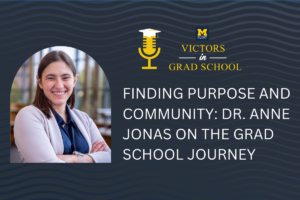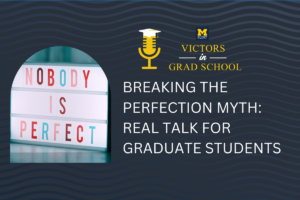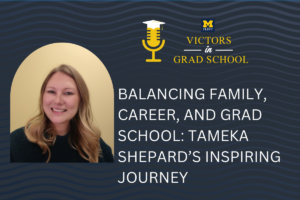Entering graduate school is a significant step in one’s academic and professional journey. It requires careful consideration, motivation, and a clear vision of how it will contribute to personal and career growth. In this week’s Victors in Grad School Podcast, Marsha Hare, an international logistics analyst with XPO Logistics, shares her inspiring journey from undertaking undergraduate studies to successfully completing a Master of Science Administration in Information Resource Management at Central Michigan University. Her experiences provide valuable insights for individuals considering or currently pursuing graduate education.
Transitioning from Undergraduate Work to Graduate School
Marsha reflects on her decision to pursue graduate studies after gaining work experience following her undergraduate degree. Rather than following a predetermined path, she made the decision for herself, driven by a desire to broaden her skills and knowledge. This highlights the importance of personal motivation and autonomy when making the transition to graduate school. Her readiness for this new phase of education was influenced by reaching a point in her life where she had more time available for studying, demonstrating that identifying the right timing for graduate studies is a personal consideration that can impact one’s success in the program.
Choosing the Right Program and Institution
Marsha’s decision-making process in selecting the Information Resource Management program at Central Michigan University sheds light on important factors to consider when choosing a graduate program. Her choice was influenced by both the relevance of the program to her professional experience and the flexibility it offered. Additionally, the absence of an entrance exam requirement at the institution allowed her to focus on meeting other necessary prerequisites, giving her the opportunity to flourish without the pressure of standardized testing. This emphasizes the significance of aligning the program with one’s career goals and considering the educational environment that best suits individual learning styles.
Adapting to Graduate Study: Strategies for Success
Marsha’s decision to pursue her studies online required discipline, meticulous planning, and effective time management. Her approach to organizing her study schedule by looking ahead at the curriculum, establishing deadlines, and understanding her personal learning process exemplifies the adaptability and self-awareness needed to excel in a graduate program. Her commitment to studying during work breaks and utilizing available resources, such as the workplace gym, showcases the creativity and determination required to balance work and academics. Marsha’s experience emphasizes the importance of self-discipline, organization, and utilizing available resources to succeed in the unique challenges of a graduate program.
Impact of Graduate Education on Professional Growth
Marsha’s graduate education directly impacted her professional role by enhancing her research skills and data analysis capabilities. Her ability to conduct thorough research and analyze data efficiently elevated her performance in the logistics industry. While not directly leading to a promotion, the knowledge and skills gained from her program equipped her to handle complex industry challenges with confidence. Marsha’s experience underscores the potential for a graduate degree to elevate one’s expertise and proficiency within their professional domain.
Tips for Success: Navigating Graduate School
Marsha’s advice for future graduate students emphasizes the significance of collaborative work and adaptation to diverse perspectives. Encouraging an open-minded approach and respectful interaction within group settings highlights the value of networking and the potential for personal growth through varied viewpoints. Her emphasis on appreciating different perspectives and learning from others resonates with the collaborative nature of graduate education and its long-term impact on professional development.
Navigating Graduate School with Purpose
Marsha Hare’s journey through graduate school offers valuable lessons for those considering or currently pursuing advanced education. Her story demonstrates the importance of personal drive, strategic decision-making, adaptability, and the ability to leverage both personal and professional experiences to excel in a graduate program. By reflecting on Marsha’s insights, individuals can gain a deeper understanding of the considerations and strategies that contribute to a successful graduate school experience, ultimately paving the way for meaningful personal and professional growth.
TRANSCRIPT
Dr. Christopher Lewis [00:00:01]:
Welcome to the victors in grad school, where we have conversations with students, alumni, and experts about what it takes to find success in graduate school.
Dr. Christopher Lewis [00:00:11]:
Welcome back to Victor’s in Grad School. I’m your host, doctor Christopher Lewis, director of graduate programs at the University of Michigan Flint. Really excited to have you back again this week. I love being able to sit down and talk with you every week and to be able to walk with you on this journey that you’re on. I say journey because it is a journey, and every person goes through a journey as they’re thinking about graduate school, as they’re going through graduate school, as they’re preparing to leave graduate school. And you and I are on this journey together because I know that every person’s journey is a little bit unique, and it’s important for you to be able to have some tools in your toolbox to help you along this path that can open your eyes to some of the things that you might be able to do, even right now, that can help you to be successful in graduate school. And that’s why this podcast exists. It exists to help you to be able to learn from other people, other people that have conned before you.
Dr. Christopher Lewis [00:01:12]:
And that’s why every week I love being able to have different guests, guests that have gone to graduate school in the past, have learned, they have grown, have been successful in that journey, and I can share that journey with you as well. Today, we got another great guest with us today. Marsha Hair is with us today. And Marsha is a international logistics analyst with XPO Logistics, and she has been there for quite a few years. And she did her graduate work at Central Michigan University, but before that was at the University of Michigan Flint. And we’re gonna talk about the journey that she went on, going from her undergraduate work to working to going to get her graduate degree and learn from that journey along the way. Marsha, thanks so much for being here today.
Marsha Hare [00:02:01]:
Thank you for having me.
Dr. Christopher Lewis [00:02:02]:
It is my pleasure. Love being able to have you here. I wanna turn the clock back in time because I know you did your undergraduate work at the University of Michigan, Flint. You did your bachelor’s of business administration at U of M Flint, and you did that in human resources and organizational behavior management. And then you went off and you worked for a while. And sometime in that period of time between when you graduated and in your work life, you made a decision. You made a decision to go back to school. What was going through your head as you were out in the workforce and you were deciding to go and go back to school after being in the workforce for some time?
Marsha Hare [00:02:43]:
What was going through my head when I did my undergraduate studies? I kind of did that because that was, like, the next step. That’s what I was told in school. This is the next step. The family encouraged me to go to college. So when I decided to go back to graduate school, I was doing it for me, solely for me, something that I wanted to do. I was at a point in my life where I was ready. My oldest was, believe he was grown at the time and my youngest was old enough to kind of have some independence. So I was able to have the time I needed to study.
Marsha Hare [00:03:10]:
And then I wanted to broaden my ideals and my skills for the job that I was in, for the work environment that I was in.
Dr. Christopher Lewis [00:03:18]:
So you’ve got a Master of Science Administration in Information Resource Management. Talk to me about the decision, not only to study that, but the decision to ultimately attend Central Michigan University. What what was it about that specific field that you decided that you wanted to focus in on that and why Central Michigan?
Marsha Hare [00:03:39]:
So I actually was going to the SAP program that Central Michigan offered. But, because that was the a program that we were currently working in at my job, but and it was mostly, like, for Mexico suppliers that I was using that particular application for. But it was a little more costly, so I decided to just go to the information resource management program because it kind of had some similarities and a little bit different, but I was still dealing with a lot of information, a lot of data in my day to day work. So that was one of the reasons I chose that program. The other reason I chose, Central Michigan for that particular program, I’m not good at testing. I’m sure a lot of students probably can can identify with that. Not that I’m terribly bad, but I just it’s uncomfortable sometimes for me, And I did not have to take an entrance exam to get into that program, but I did have to take a couple of prerequisites. And there were some other requirements that I had to do, but I met all of those.
Marsha Hare [00:04:39]:
And I was so proud of myself that I didn’t have to have a exam tell me this is how I felt. Not saying everybody feels that way, but I didn’t have to have an exam tell me if I was smart enough to get in that program or not. But I was able to get in that program, and I actually got the best GPA that I ever had. Of course, being more mature at the time helped a lot and having the work experience helped a lot, but still I was just at that time where I was able to focus and I was ready for it. So that is why I went to CMU, and that is why I selected that particular program.
Dr. Christopher Lewis [00:05:12]:
Now there was a number of years between when you did your undergraduate work and you went into your graduate work. And going through undergraduate studies, you’re taught in a specific way. When you go to graduate school, it’s a little bit different. And you have to transition, and you have to understand and learn what you have to do to find success. So can you think back to that transition that you went through and what you found that you had to do to and what you found that you had to do to find success in graduate school. What did you have to do specifically to be able to set yourself up for success as you entered into the program? And what did you have to do to maintain that success throughout the entirety of the program?
Marsha Hare [00:06:00]:
So I was a little unique in how I approached grad school. I did not take your traditional sit in class and do the lecture for them. I actually did my whole program online. So it took some discipline, and it took some planning. So what I did, I looked at the curriculum of every class that I have for every semester. I looked at the requirements. I looked at the assignments, when they were gonna be due. What was going to be the components of making that assignment complete? And I’ve got a planner, a desk planner, and I wrote out all the due dates on my planner.
Marsha Hare [00:06:37]:
And then I went back, and and it took probably about a couple semesters for me to kinda figure out how long it takes me to, like, read the assignment before I actually get to doing, do the homework and turn it in. So I had to kinda learn what my learning process was. So once I figured that out, then I would count, like, backwards. From the date it was due, I would go back maybe 5 days and say, okay. I need to start here and plug in 2 hours of my day to study for this specific class. And then because I was working full time, I would also it depends. Sometimes if I had a minute, I take my breaks and study. We actually had a workout room on our worksite.
Marsha Hare [00:07:15]:
So I would take my books and put them up on the treadmill and walk and read because sometimes reading makes me drowsy. So I would figure it out. Do what I had to do. And then on my lunch breaks, I would study. When I came home, I get the kids all straight, and then I would take whatever time I needed in the evenings to study or be online. And then the weekends. But it was fast. It was a little more condensed than your traditional in person forum, but I had to be very focused and very organized in order to have a successful online master’s program experience.
Dr. Christopher Lewis [00:07:51]:
And you were successful. You were able to go on from there and continue on. You’ve got your degree continued in your career. Talk to me about after getting that master’s degree and even today, how do you feel that the graduate degree prepared you for the work that you do on a daily basis?
Marsha Hare [00:08:09]:
Some people get promotions. This is probably funny, but I didn’t really get a promotion. I did get more work. I would just go okay. But what it did, it was a lot of research that was required in that program. So it made me do a lot more research when I was looking for or working through certain problems or trying to understand a particular segment of the industry that I was in. So that part was really good for me. It was very helpful.
Marsha Hare [00:08:36]:
The data that I encountered did help me with analyzing the data so that I could give feedback on what trends are happening in my particular segment or in the logistics world. So that was helpful.
Dr. Christopher Lewis [00:08:49]:
Thinking back to your graduate education, the graduate degree that you did receive and what you learned in that process. And thinking about students that are coming up now and are looking at graduate school or maybe going through graduate school, what are some tips that you might offer to them that would help them to find success sooner?
Marsha Hare [00:09:12]:
In my graduate studies, I had to I was in a lot of groups, lot of group settings. So if you’re not a person that works with others or likes to work with others, you’re gonna have to change that depending on your program. But for my particular program, I like working with others, but I’m kinda used to doing my own thing. So I did have to make sure that you understand your group, you know, their personalities. You’re open to the differences of opinion, the differences of styles, and appreciate that everyone brings something different or a different piece of the problem to the table. And that really helped me grow. That helped me grow in my in my position today and just over my career because my career requires me to be in different groups, and it requires me to interact with different departments. And so I have to have an appreciation for different perspectives.
Marsha Hare [00:10:04]:
And I learned I learned a lot from other people and how they look at and how they approach problems. So that was very, very, very helpful, and I think that’s a good tip for people that’s going to have to interact with the public or interact with other groups. They need to have an open mind and definitely share their own experience as well, but just be respectful of each other.
Dr. Christopher Lewis [00:10:25]:
Great tips and definitely things to think about. You’re going to definitely have opportunities in grad school to work with others, and that helps you build your network as well. So the more that you are able to push yourself out there, put yourself out there, and share, as you said, your experiences, the better off you’re gonna be. So, Marsha, thank you. Thank you for sharing your journey today, for, you know, expressing and thinking back to the journey that you went through and sharing some of the tips that you learned along the way. And I truly wish you all the best.
Marsha Hare [00:10:57]:
Thank you. Thank you for having me.
Dr. Christopher Lewis [00:10:59]:
The University of Michigan Flint has a full array of master’s and doctorate programs if you are interested in continuing your education. Whether you’re looking for in person or online learning options, the University of Michigan Flint has programs that will meet your needs. For more information on any of our graduate programs, visit umflint.edu/graduateprograms to find out more. Thanks again for spending time with me as you prepare to be a victor in grad school. I look forward to speaking with you again soon as we embark together on your graduate school journey. If you have any questions or want to reach out, email me at flintgradoffice@umflint.edu.





